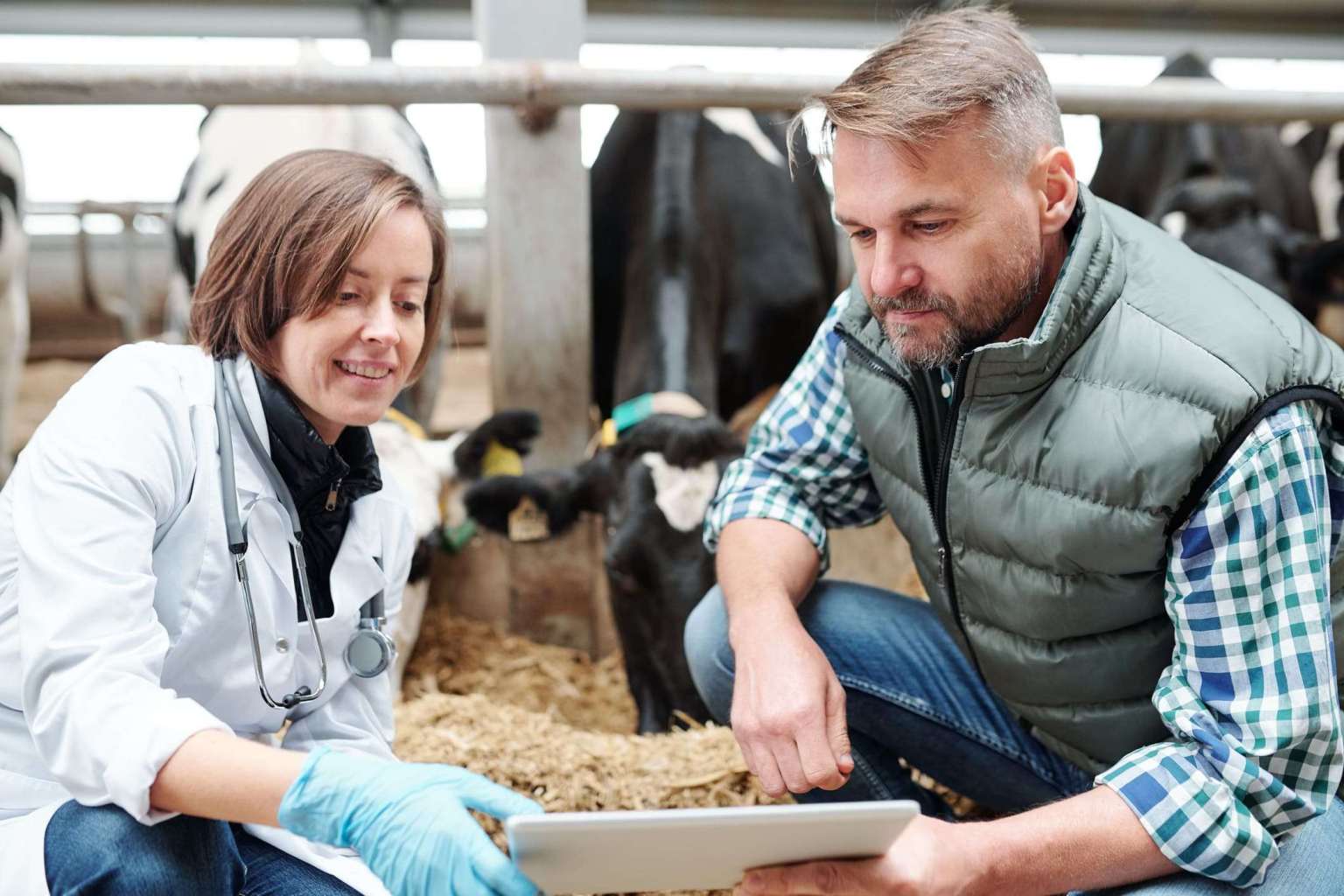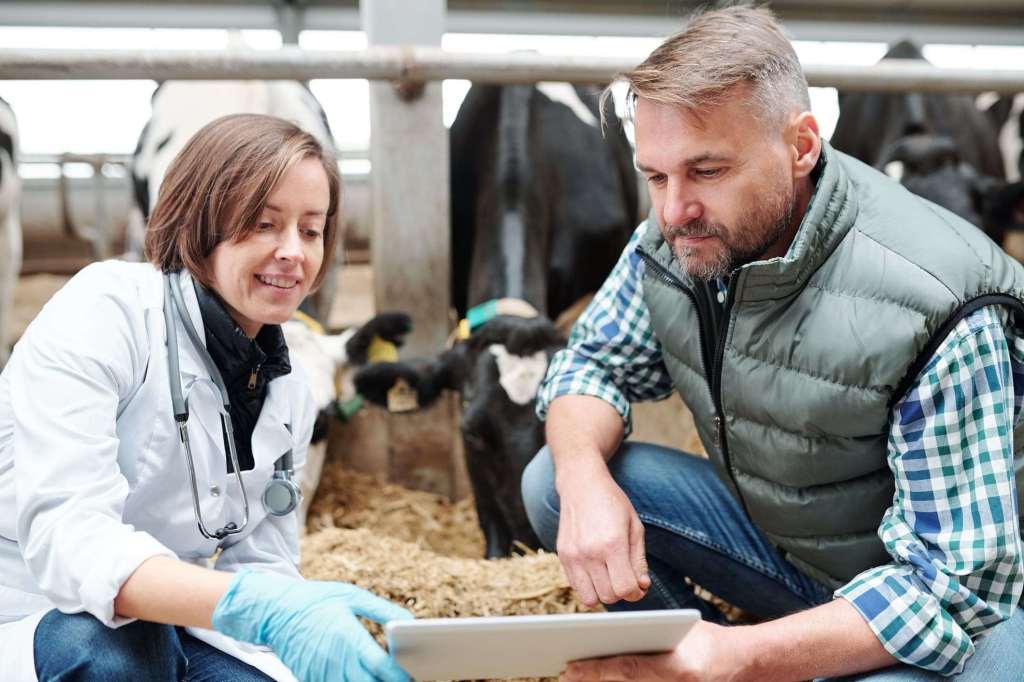
How to Become an Animal Nutritionist: Career Path, Education and Skills
Discover this pathway into veterinary care as a practicing nutritionist.
Wondering how to become an animal nutritionist? If you’re passionate about pets or livestock and want to turn that passion into a career, nutrition is a field that plays a vital role in animal wellbeing.
Animal nutrition is a critical, often overlooked part of veterinary science, and its impact is surprisingly wide-reaching. Tailored diet plans for livestock can boost milk yields by up to 20%, and for pets, a precise nutrition plan might mean the difference between chronic illness and long-term well-being.
So what does an animal nutritionist do and how much do animal nutritionists make? Let’s take a closer look!
What Is an Animal Nutritionist?
An animal nutritionist is a trained professional who studies what animals eat and how those diets influence health, development and productivity. They work with companion animals, farm animals, wildlife and sometimes even exotic species, designing feeding plans that meet complex physiological needs.
If you’re exploring veterinary career paths, it’s worth knowing that an animal nutritionist is not always a medical school educated veterinarian, but Board-Certified Veterinary Nutritionists are qualified veterinarians with a Doctor of Veterinary Medicine (DVM) degree.
What Does an Animal Nutritionist Do?
What does an animal nutritionist do day-to-day? It varies, but typical responsibilities include:
- Diet Planning and Formulation: Designing balanced feeding programs tailored to species, life stage, health goals or production needs.
- Performing Nutritional Assessments: Evaluating feed intake, body condition and growth patterns. Milk yields are also evaluated in species like cows.
- Research and Testing: Investigating nutritional solutions, like probiotics in poultry or alternative proteins for sustainability.
- Education and Collaboration: Teaching pet owners, farmers and veterinary teams about animal diets and wellness strategies.
- Quality Control and Regulatory Checks: Ensuring feed meets safety and nutritional standards in manufacturing or research contexts.



Where Do Animal Nutritionists Work?
Animal nutritionists work in a wide variety of settings. Many find roles on farms or in livestock operations, designing feed programs to boost productivity and support herd health. Others are employed in veterinary clinics and hospitals, helping pets recover from illness through therapeutic diets. Some work in commercial feed and pet food companies, developing new formulas and ensuring product safety.
You’ll also find animal nutritionists in more specialist environments like zoos, aquariums, wildlife rehabilitation centers and animal shelters, where unique dietary challenges demand creative solutions. Academic and research institutions offer opportunities to lead or contribute to scientific studies, while regulatory agencies and NGOs rely on nutritionists to shape public policy, conduct inspections or manage large-scale animal health initiatives. Whether you’re aiming to be a livestock nutritionist, pet nutritionist or equine nutritionist, this field offers a diversity of practice setting options.
How To Become an Animal Nutritionist
- Earn a Relevant Bachelor’s Degree
Your first step is academic. Most animal nutritionists begin with a bachelor’s degree in animal science, biology or a related field. The coursework will usually include animal physiology, nutritional biochemistry, microbiology, genetics and sometimes food science.
- Gain Hands-On Experience Through Internships
Real experience is just as important as theory. During or after your undergraduate degree, seek out internships in veterinary clinics, farms, feed companies or even research labs. These placements offer the kind of day-to-day insights you won’t get from textbooks. You’ll see what it means to design and evaluate feeding programs, track animal health outcomes and work with teams that include vets, technicians and owners.
- Consider a Doctor of Veterinary Medicine (DVM) Program
While a bachelor’s degree can get your foot in the door, an advanced veterinary degree opens the door wider, especially in research, academia or highly technical roles. A DVM program provides a deeper understanding of metabolism, clinical nutrition and biotechnology. You may also complete original research, preparing you for a future as a university lecturer or lead nutrition scientist. In short, earning a DVM degree greatly increases your veterinary knowledge and skills, and provides many more opportunities for career practice.
- Obtain Certifications
Certifications demonstrate your expertise and professional commitment. You might pursue credentials such as Certified Animal Nutritionist (CAN), Certified Pet Nutritionist or the elite Board-Certified Veterinary Nutritionist credential offered through the American College of Veterinary Nutrition. These recognitions aren’t required for every role, but they can significantly enhance job prospects and earning potential. It’s worth knowing that for some of these certifications and the career paths they offer, you will need to have earned a DVM degree, not just a bachelor’s or master’s degree.
Skills Required for a Successful Career in Animal Nutrition
Success in this field requires both scientific understanding and interpersonal skills. Animal nutritionists need:
- Attention to Detail: Precision is vital as errors in feed formulation can risk health and productivity.
- Communication Skills: Explaining complex nutrition plans to owners, farmers or other vets calls for clear, persuasive language.
- Commitment to Ethics and Sustainability: Implementing eco-friendly diets and ensuring feed standards support long-term health.
- Problem-Solving Skills: Adapting diets to allergies, health conditions or environmental stressors is a regular challenge.
- Scientific and Analytical Skills: Ability to interpret data, calculate nutrient profiles and tailor diets using feed software.
- Tech-Savviness: Knowledge of diet analysis software and emerging technology is increasingly important.
How Much Do Animal Nutritionists Make?
The answer depends on experience, sector, location and qualifications, but the earning potential is strong. According to SalarySolver, animal nutritionists can expect to make approximately $77,000 USD on average. Salaries range from $58,000 USD for entry-level nutritionists to $103,000 USD for more experienced and specialized practitioners. Roles in feed companies or agricultural support, or specializations such as canine nutritionist or equine nutritionist, typically result in higher salaries.
In clinical settings, especially for those who become Board-Certified Veterinary Nutritionists (which requires a DVM), earnings can be even higher. Roles in pet food development, corporate consulting or academic research can also command high salaries. Geographic location plays a role as well, as urban or research-heavy regions often offer higher pay. Whether you’re pursuing general animal nutritionist jobs or a veterinary specialty, the financial rewards are compelling.
Job Outlook and Careers in Animal Nutrition
Careers in animal nutrition are expected to grow steadily as demand rises for more sophisticated animal diets and sustainable feeding strategies. The increase in pet ownership and rising interest in wellness means more people are seeking advice from pet nutritionists and canine nutritionists, while the livestock sector continues to innovate around feed efficiency and environmental impact.
Advances in feed formulation software, microbiome research and alternative proteins are creating new opportunities for both research and industry specialists. Veterinary hospitals and teaching institutions are also expanding their nutrition departments to reflect growing interest in preventative care. Whether you aim to become a vet nutritionist, livestock nutritionist or work in policy, academia or feed technology, nutrition promises to feature heavily in the future of veterinary medicine.
How St. Matthew’s University Prepares You for a Career in Animal Nutrition
At St. Matthew’s University School of Veterinary Medicine (SMUSVM), we’re committed to preparing students for successful careers as practicing veterinarians, which includes specialized careers in animal nutrition.
Our DVM program integrates essential coursework in nutrition and physiology with access to labs, research support and dedicated faculty mentorship. Whether your passion lies in clinical nutrition, food animal science or pet wellness, SMUSVM provides a solid academic and clinical foundation for a career in animal nutrition.
For more information, gain firsthand insights about our school and DVM program in this alum testimonial video:
You can also learn more about your pathway to a career in animal nutrition by attending an upcoming event or contacting us. Or get started today by learning how to apply!
FAQs About Animal Nutrition
Not always. Many roles in feed manufacturing, research or livestock nutrition require only a bachelor’s degree and relevant experience. However, to become a Board-Certified Veterinary Nutritionist, you do need a DVM degree and often some residency training. Additionally, a DVM degree can open many doors and increase your earning potential, even for those not aiming to become certified.
Salaries vary widely, but experienced professionals in research, corporate or specialist settings can earn $90,000 USD or more. Board-Certified Veterinary Nutritionists or senior industry consultants may exceed $100,000 USD annually. Regional demand and specialization significantly impact earning potential.
It can be challenging, as the field combines rigorous science requirements with real-world problem-solving demands across species. You’ll need strong analytical skills, attention to detail and effective communication abilities. For those driven by a passion for animal care and scientific curiosity, meeting this challenge is deeply satisfying.
A veterinary nutritionist holds a DVM degree, has completed a residency program and has attained board certification (e.g., ACVN). They diagnose medical issues, prescribe therapeutic diets and work within veterinary teams. A pet nutritionist might have a bachelor’s or master’s in animal nutrition and focuses on pet diet advice and commercial feeds, without surgical or medical authority.